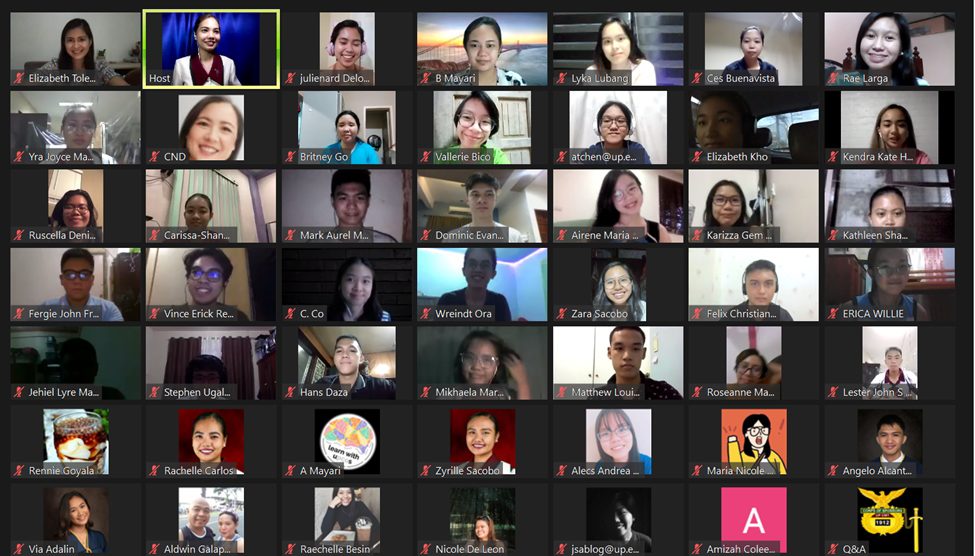
Last March 13, 2021, the UP Corps of Sponsors Diliman launched the second installment of Learn With UP CoS. Much like the first installment, this webinar offered ways to help participants cope with the current reality. While the first installment was centered on coping with the new methods of learning, the second focused on interpersonal development.
Entitled “Love (Languages) in the Time of CoViD-19,” the second installment was spearheaded by the Corps Operations and Training Sponsor, Miss Rachelle A. Carlos, and the Infantry Unit Sponsor, Miss Zyrille Y. Sacobo. They were joined by their guest speaker, Ms. Elizabeth A. Toledo, who tackled ways to fill one’s love tank amidst this trying time.
Ms. Toledo is a registered psychometrician who graduated cum laude with a Bachelor’s degree in BA Psychology from the University of the Philippines Diliman in 2016. Further, she accomplished her Master’s Degree in Counseling and Psychology at Ateneo de Manila University in 2020. She is currently a full-time faculty in the University of the Philippines Visayas, Psychology Cluster. An independent consultant for DSWD and other organizations, she also serves as volunteer counselor and coordinator of UGAT SandaLine, UGAT Foundation, Inc.
Ms. Liz, as she likes to be called, began her talk with the simple statement: “We express love differently.”
She went on to explain the five love languages of Dr. Gary Chapman — words of affirmation, quality time, gifts, acts of service, and physical touch. She touched on the reality that while the pandemic has definitely affected our relationships, it has also given us new ways to thrive. After she described the dangers of social distancing and isolation — from homesickness and loneliness, spikes in break-ups, frequent misunderstandings and miscommunications, and even domestic violence — she pointed out that these negatives were balanced out by how relationships were changed by the pandemic — increased bonding time, reconnecting with old friends, and even meeting new people online.
She encouraged the audience to practice A.C.L. — awareness of one’s self and others, courage to self-disclose and express wants and needs, and love. She shared ways to fill one’s love tank through the use of love languages, and offered tips on how to adapt these love languages in the time of the pandemic. For those with physical touch as a primary love language, she encouraged them to cuddle pets and even to learn a new love language or focus more on their secondary one. For those with words of affirmation, she suggested they write these words down, send a text, or even call a friend or family member. For gifts, she emphasized the importance of the sentiment of the gift — not the price or the extravagance. For acts of service, she encouraged one to help alleviate stress — offering help and even, offering time to accomplish a task without disturbance. For those with quality time, she recommended they make use of technology to set up online dates, try socially distanced outdoor activities, and make use of the “Do Not Disturb” feature of their phone. She ended her talk with a simple reminder to “spread the love and be the love.”
By the end of the program, the event was able to gather over fifty participants with a majority of them being college students from UP, several through the endorsement of the NSTP Offices from Diliman and Manila. The attendees who answered the evaluation forms were also given e-certificates of participation.
Although it has been a year since our world was turned upside down by this pandemic, people are still adapting to the changes it has brought. Because of these changes, the way we give and receive love is also changing. Here’s a reminder to be a little kinder to yourself, spread the love, and be the love.
In case you missed it, catch up on the webinar by watching the recording at the UP ROTC YouTube channel here at https://youtu.be/k4V03SoL-oI.



